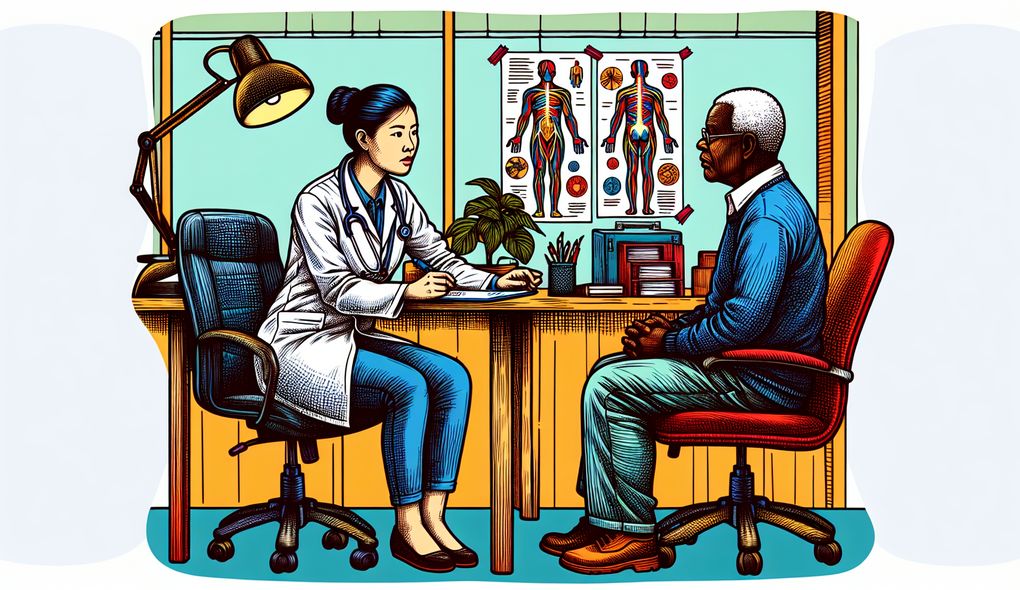Have you ever encountered a situation where a patient's pain worsened despite your treatment efforts? How did you handle it?
INTERMEDIATE LEVEL

Sample answer to the question:
Yes, I have encountered a situation where a patient's pain worsened despite my treatment efforts. I had a patient who was suffering from chronic back pain. I initially prescribed him a combination of pain medications and physical therapy. However, after a few weeks, his pain intensified and he was unable to find relief. I realized that I needed to reassess his condition and explore alternative treatment options. I consulted with a colleague who specialized in interventional pain management and together we decided to try a nerve block procedure. Fortunately, the procedure was successful and the patient experienced significant pain relief. This situation taught me the importance of being flexible in my treatment approach and collaborating with other healthcare professionals when necessary.
Here is a more solid answer:
Yes, during my experience as a Pain Management Physician, I have come across instances where a patient's pain worsened despite my treatment efforts. One notable case involved a middle-aged patient with fibromyalgia who had been on a stable medication regimen for several months. However, she suddenly began experiencing a significant increase in pain that was interfering with her daily activities. I conducted a thorough evaluation to rule out any new underlying conditions or exacerbating factors. After discussion with the patient, it became clear that she was also dealing with heightened stress and anxiety, which could have contributed to her worsening pain. I adjusted her medication plan to include an anxiolytic agent and recommended stress management techniques such as mindfulness and breathing exercises. Additionally, I referred her to a psychologist who specialized in pain management. By taking a comprehensive approach and addressing the psychological aspect of her pain, we were able to gradually improve her symptoms and restore her functionality. This experience reinforced the importance of considering the holistic needs of each patient and collaborating with other specialists when necessary.
Why is this a more solid answer?
The solid answer provides a more detailed and comprehensive response, addressing the evaluation areas more effectively. It includes specific details about the patient's condition, the diagnostic process, and the multidisciplinary approach taken to address the worsening pain. However, it could further emphasize the communication and interpersonal skills involved in effectively collaborating with other professionals.
An example of a exceptional answer:
Yes, I have encountered a situation where a patient's pain worsened despite my treatment efforts. It was a challenging case involving a patient with complex regional pain syndrome (CRPS) who had been under my care for several months. We had been managing her pain successfully with a combination of medication, physical therapy, and nerve blocks. However, during a routine follow-up appointment, she complained of a sudden intensification of pain in her affected limb. Recognizing the potential severity of CRPS progression, I immediately conducted a detailed assessment to identify any possible triggers or underlying factors. I discovered that she had recently experienced a traumatic event, which had triggered a significant increase in stress and anxiety levels. I decided to take a holistic approach to her treatment by incorporating cognitive-behavioral therapy (CBT) sessions to address the psychological impact of her condition. I also coordinated with her primary care physician to adjust her pain medication and add adjunctive medications to target the CRPS symptoms more effectively. Over time, with a combination of physical therapy, medication optimization, and CBT, we were able to restore her pain control and improve her overall quality of life. This experience reinforced the importance of constantly assessing and adapting the treatment approach, considering the psychological aspect of pain, and working collaboratively with other healthcare professionals.
Why is this an exceptional answer?
The exceptional answer showcases a high level of expertise and proficiency in pain management. It demonstrates the ability to handle complex cases, adjust treatment plans, and collaborate effectively with other professionals. The answer also highlights the commitment to ongoing professional development and education in pain management, as well as the ability to address the evaluation areas comprehensively.
How to prepare for this question:
- 1. Familiarize yourself with different types of pain conditions and their management strategies. This will enable you to discuss specific cases in your answer.
- 2. Reflect on your past experiences where a patient's pain worsened despite your treatment efforts. Identify the key lessons learned and the steps you took to address the situation.
- 3. Highlight your ability to conduct thorough evaluations to identify potential triggers or underlying factors contributing to the worsening pain.
- 4. Emphasize your commitment to a holistic approach in pain management, considering both pharmacological and non-pharmacological interventions.
- 5. Discuss your experience in collaborating with other healthcare professionals and the importance of multidisciplinary teamwork in managing complex pain cases.
- 6. Mention any additional certifications, specializations, or ongoing education you have pursued in pain management to showcase your commitment to professional development.
- 7. Practice delivering your response in a concise and confident manner to ensure clarity and coherence during the interview.
What are interviewers evaluating with this question?
- Thorough understanding of pain management principles and pharmacotherapy.
- Strong diagnostic skills and the ability to develop comprehensive treatment plans.
- Excellent communication and interpersonal skills for patient and staff interactions.
- Ability to work efficiently in a multidisciplinary team.
- Commitment to ongoing professional development and education in pain management.

